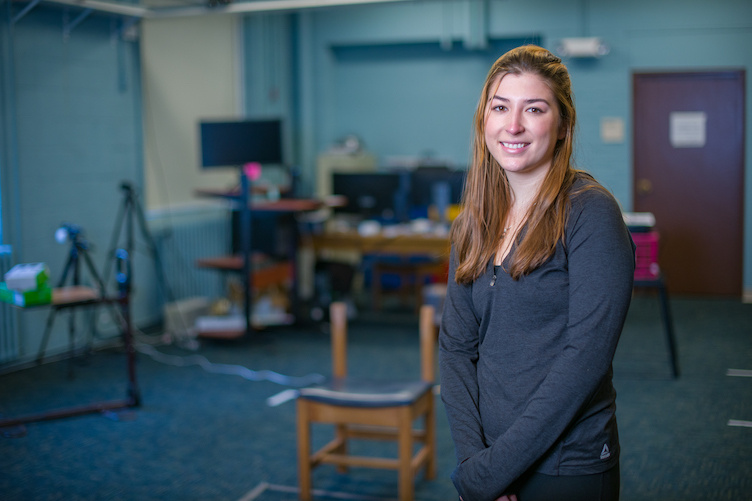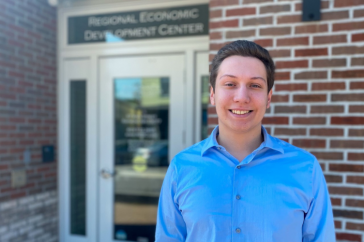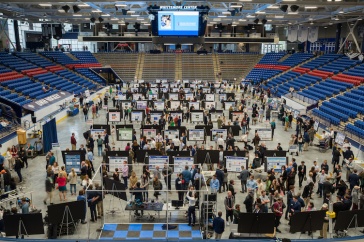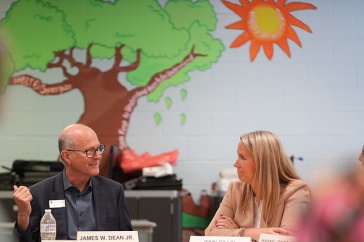
Before Vicky Bandera '19 could start the research project that she’d pitched to her advisor and then received a Summer Undergraduate Research Fellowship to conduct, she had to teach herself how to use a highly complicated math software program so she would be able to analyze her data.
She also spent the spring semester developing procedures for the research, which compared the leg strength in women over 50 who had undergone chemotherapy with that of women in the same age group who had not. Then Bandera was ready to try to answer the question: does cancer treatment affect muscle strength? She discovered the answer was yes.
“The level of expertise needed to conduct this study is beyond what is typical for an undergraduate, and the project easily meets the expectations of a master’s thesis.”
“Older people who are cancer survivors are two times as likely to fall than their peers,” Bandera says. “You have to fight that muscle loss. Chemo and radiation take a hard toll. There can be significant changes.”
Comparing the two groups helped show the degree of those changes. The subjects who had been treated for cancer were between 6 months and 10 years out from treatment, with an average of 2 ½ to 3 years. In addition to health factors, Bandera looked at age, fitness, the amount of time spent exercising per week and whether that exercise was light, moderate or vigorous. The range of individual fitness was also a factor, with very active to extremely sedentary subjects in both groups.
Bandera studied functional demand — the ratio of the muscular force required by a physical task to the maximal force capacity of the muscle — to determine whether activities like getting up from a chair are more tiring for those who have been treated for cancer than for those who have not.

Vicky Bandera adds reflective markers to a subject’s legs before exercise begins.
“If functional demand is high, it’s almost like sprinting,” says Bandera, an exercise science major in the College of Health and Human Services. “If your upper body is weak and you can’t carry a bag of groceries that’s one thing, but if you can’t move, that impacts everything you do.”
The results of her research showed significant reductions in strength— up to 30 percent — for cancer survivors. The lower the strength, the higher the functional demand was, and therefore, the more tiring the exercise. Bandera used a biomechanics method that has been employed by a handful of researchers but never on cancer survivors.
“They typically study older versus younger populations versus clinical,” she says. “Using this method on a clinical population simply allowed us to look at the effects of disease and treatments on strength in a different way than what has typically been done.”
Bandera presented her findings in November at the New England Chapter meeting of the American College of Sports Medicine and will present them again in May at the organization’s annual meeting in Orlando, Florida, as well as during UNH’s 2019 Undergraduate Research Conference and the College of Health and Human Service’s Grimes Undergraduate Research Competition.
“The level of expertise needed to conduct this study is beyond what is typical for an undergraduate, and the project easily meets the expectations of a master’s thesis,” says Dain LaRoche, associate professor of exercise science and Bandera’s advisor on the project. In a letter recommending Bandera for a scholarship, LaRoche wrote, “I consider her in the top 1 percent of the hundreds of students I’ve worked with in the last 10 years."
“What was particularly impressive to me was the way Vicky recruited her participants,” LaRoche says, noting Bandera contacted oncologists, hospital administrators, cancer support groups and senior centers.
“I loved working with every single subject,” the New Jersey resident says. “There isn’t a book in the world or a class in the world that could have taught me as much as they did. I learned so much about people. I’m not going to forget that.”
See where a degree in exercise science can take you.
-
Written By:
Jody Record ’95 | Communications and Public Affairs | jody.record@unh.edu



















































